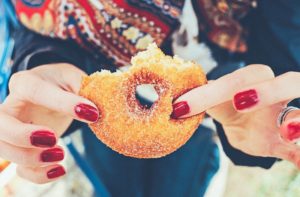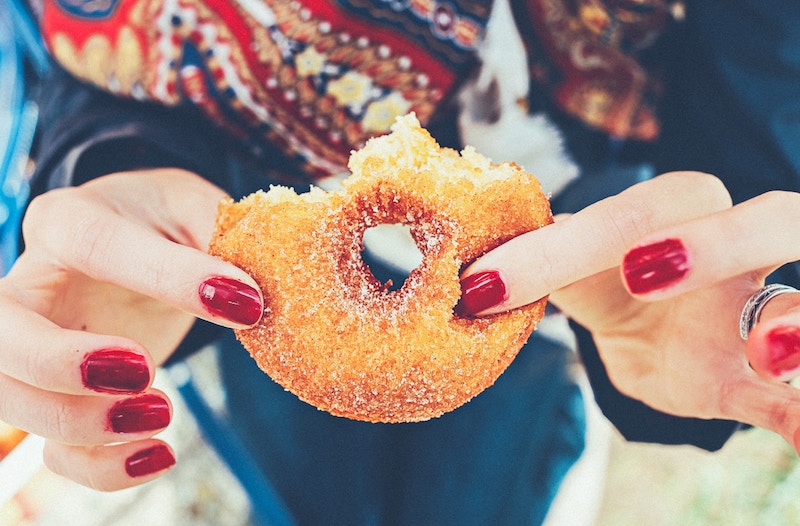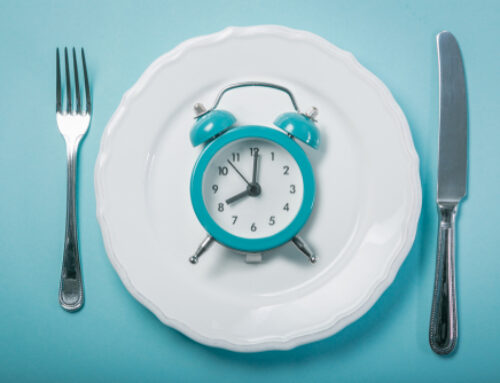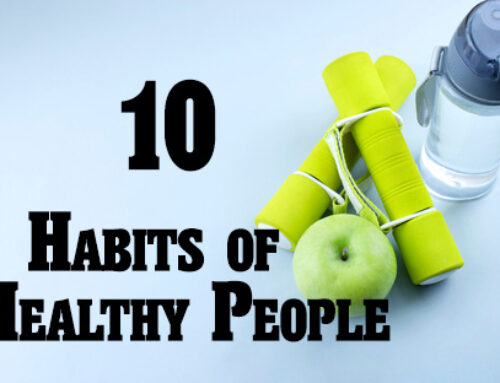Are you a sugar addict? This might be easy to answer, but hard to admit. What does it really mean to be a sugar addict, and can you break this addiction?
Sugar addiction obviously begins when you crave anything that contains this sweet ingredient. Eating sugar triggers production of natural opioids like dopamine in your brain. Opioids aid in relieving pain and depression and are triggered in the same way one would consume illegal drugs. Some studies have shown that sugar is eight times more addictive than cocaine.
According to researchers, your tongue has two sweet receptors in it.
For several millenniums humans have eaten food grown in the garden, meat that has been hunted, whole grains they farmed, or nuts they have foraged. These traditional foods were not typically sweet and therefore the brain was just slightly stimulated by the tongue’s sweet receptors.
Today’s foods are loaded with sugar, but our tongues have not adapted to these overly sweet treats. Our receptors on the tongue stimulate the brain which sends out excessive reward signals whenever you eat something with sugar in it. This overloads your self-control mechanisms and leads to addiction.
Sugar Addiction Quiz
Answer honestly yes or no to the following questions:
- Do you feel hungry even after eating a full meal?
- Can you eat large quantities of sweet or starchy foods even when you’re not feeling particularly hungry?
- Do you ever feel ashamed (self-loathing, disgusted, or depressed) about your eating habits?
- Do you ever turn to sugar when you are feeling down or upset?
- Do you plan to eat a small portion (such as one biscuit) but end up binge-eating the whole batch?
- Do you find it difficult to stop once you start eating starches, snack foods, junk foods, or sweets?
- Are your eating habits having an impact on your social life, work, or physical abilities?
- Do you feel you need to have something sweet after lunch or dinner?
- Do you eat sweets and chocolates secretly, hiding the wrappers because you don’t want anyone to know?
- Do you get a foggy head after big meals, mid-morning, or mid-afternoon?
- Do you have neck stiffness, pain, or a headache after skipping a meal?
If you answered yes to five of these questions or more, you can diagnose yourself as a sugar addict.
How to Break Sugar Addiction
Don’t worry, we have a few tips on how you can break your sugar addiction. The chains of addiction do not have to hold you down any longer.
- The first tip is to appeal to your emotions. Frequently that need for something sweet is more of a need to relax from a stressful day or find energy when you’re tired. Even depression, anger, and boredom can trigger a desire for a small treat. More often than not, people tend to ignore their emotions when considering whether to eat healthy or unhealthy choices. Understanding your current emotional state and the role it plays in your eating decisions is a good place to start in breaking your sugar addiction. Try delaying that impulse for 15 to 20 minutes and take that time to sort out if you are really hungry or if other emotions are triggering a craving. It will also give you enough time to plan a healthier alternative to your sugar craving.
- Another way to reduce sugar consumption is to lessen the amount of sugar that you consume on a daily basis. Sugar consumption should be below 25 grams, including sugar from whole fruits. A great rule of thumb is to look for foods that are less than 4g per serving of sugar. That will keep you from consuming a high glycemic food that will send your cravings into overdrive.
- Any food that includes high fructose corn syrup should be avoided. This highly addictive sweetener quickly raises your blood sugar and has been linked to many forms of cancer, diabetes, and heart disease. Interestingly your
 brain becomes more addicted to high fructose corn syrup (HFCS) than sugar. This causes cravings for soda, bread, dipping sauces, candy, ice cream, and many other foods containing this deadly ingredient.
brain becomes more addicted to high fructose corn syrup (HFCS) than sugar. This causes cravings for soda, bread, dipping sauces, candy, ice cream, and many other foods containing this deadly ingredient. - Watch for trigger foods. Some foods that do not have a sweet taste or much of a glycemic impact can still cause a sugar craving by being a trigger food. These foods have a high association with sugary treats and will spark the desire for sugar. Think of how coffee triggers the desire for a doughnut or a cookie. Pizza often triggers the need for a soda or a beer. Even a salty snack can trigger a craving for a sweet treat. Be mindful of what triggers your cravings and how one food stimulates the brain toward another.
- Exercise can be the great addiction breaker. Get outside and soak up some vitamin D while exercising. The combination of exercise and vitamin D have been shown to increase energy levels, decrease stress and depression, and help to manage stress. The combination of reducing sugar intake and increasing exercise has been shown to suppress the appetite hormone, ghrelin. This speeds up metabolism and increases fat burning. Who knew that
 reducing sugar intake and exercising more would cause you to lose body fat? This proven combination works by changing your body’s hormonal patterns from one that stores energy (fat) to one that effortlessly burns energy.
reducing sugar intake and exercising more would cause you to lose body fat? This proven combination works by changing your body’s hormonal patterns from one that stores energy (fat) to one that effortlessly burns energy. - L-glutamine can be your secret weapon. This powerful amino acid is a building block of protein used for producing muscle in the body. But one of its lesser known uses is to stop sugar and alcohol addiction. L-glutamine helps addiction by increasing the speed of detoxification by the liver. The quicker you detox off of these addictive foods the less addiction to the foods is perceived. Try taking 5-10g of L-glutamine each day to aid in your sugar detox and break the sugar addiction.
It can be quite difficult to say no to sweets, especially if you have been consuming them on regular basis. But once you feel the effect that lowering your sugar intake has on your body, it will all be worth it. Give yourself enough grace for some innocent mistakes, but not enough to enable an addiction. Communicate with those around you, and get an accountability partner to help you make better decisions. Your body will love you for it.

Daryl C. Rich, DC, CSCS, ART®






